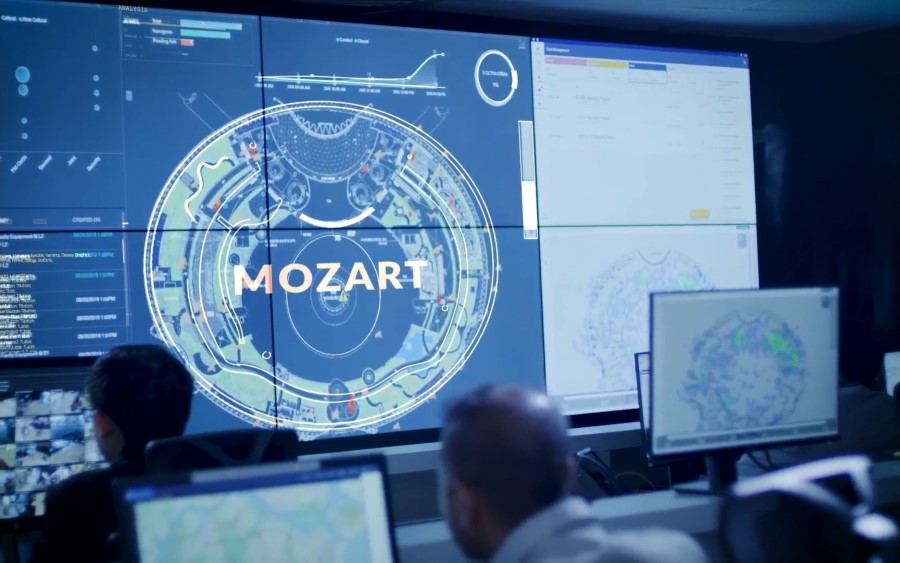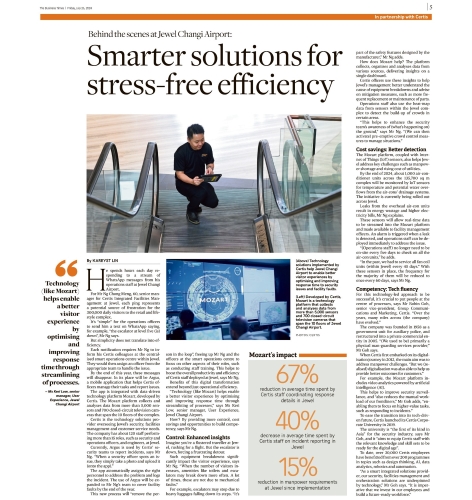Smarter Solutions For Stress-Free Efficiency
26 July 2024
He spends hours each day responding to a stream of WhatsApp messages from his operations staff at Jewel Changi Airport.
For Mr Ng Chong Meng, 60, senior manager for Certis Integrated Facilities Management at Jewel, each ping represents a potential source of frustration for the 300,000 daily visitors to the retail and lifestyle complex.
It’s “simple” for the operations officers to send him a text on WhatsApp saying, for example, “the escalator at level five (is) down”, Mr Ng says.
But simplicity does not translate into efficiency.
Each notification requires Mr Ng to inform his Certis colleagues at the centralised smart operations centre within Jewel. They would then assign an officer from the appropriate team to handle the issue.
By the end of this year, these messages will disappear. In its place will be Argus, a mobile application that helps Certis officers manage their tasks and report issues.
The app is integrated with data-driven technology platform Mozart, developed by Certis. The Mozart platform collects and analyses data from more than 5,000 sensors and 700 closed-circuit television cameras that span the 10 floors of the complex.
Certis is the technology solutions provider overseeing Jewel’s security, facilities management and customer service needs. The company has about 120 staff performing more than 15 roles, such as security and operations officers, and engineers, at Jewel.

Currently, Argus is used by Certis’ security teams to report incidents, says Mr Ng. “When a security officer spots an issue, they simply take a photo and upload it (onto the app).”
The app automatically assigns the right personnel to address the problem and logs the incident. The use of Argus will be expanded to Mr Ng’s team to cover facility faults by the end of the year.
This new process will “remove the person in the loop”, freeing up Mr Ng and the officers at the smart operations centre to focus on other aspects of their roles, such as conducting staff training. This helps to boost the overall productivity and efficiency of Certis staff deployed at Jewel, says Mr Ng.
Benefits of this digital transformation extend beyond just operational efficiency.
“Technology (like Mozart) helps enable a better visitor experience by optimising and improving response time through streamlining of processes,” says Ms Keri Low, senior manager, User Experience, Jewel Changi Airport.
How? By providing more control, cost savings and opportunities to build competency, says Mr Ng.
Control: Enhanced insights
Imagine you’re a flustered traveller at Jewel, rushing for a flight. But the escalator is down, forcing a frustrating detour.
Such equipment breakdowns significantly impact the visitor experience, says Mr Ng. “When the number of visitors increases, amenities like toilets and escalators may break down more often. A lot of times, these are not due to mechanical faults.”
For example, escalators may stop due to heavy luggages falling down its steps. “It’s part of the safety features designed by the
manufacturer,” Mr Ng adds.
How does Mozart help? The platform collects, organises and analyses data from various sources, delivering insights on a single dashboard.
Certis officers use these insights to help Jewel’s management better understand the
cause of equipment breakdowns and advise on mitigation measures, such as more frequent
replacement or maintenance of parts.
Operations staff also use the heat-map data from sensors within the Jewel complex to detect the build-up of crowds in certain areas.
“This helps to enhance the security team’s awareness of (what’s happening on) the ground,” says Mr Ng. “(We can then activate) pre-emptive crowd control measures to manage situations.”

Competency: Tech fluency
For this technology-led approach to be successful, it’s crucial to put people at the centre of processes, says Mr Robin Goh, senior vice-president, Group Communications and Marketing, Certis. “Over the years, many roles across (the company) have evolved.”
The company was founded in 1958 as a government unit for auxiliary police, and restructured into a private commercial entity in 2005. “(We used to be) primarily a physical man-guarding services provider,” Mr Goh says.
When Certis first embarked on its digitalisation journey in 2012, the main aim was to address manpower challenges. “But we (realised) digitalisation was also able to help us provide better outcomes for customers.”
For example, the Mozart platform includes video analytics powered by artificial intelligence (AI).
This helps to improve security surveillance, and “also reduces the manual workload of our frontliners,” Mr Goh adds, “enabling them to focus on higher-value tasks, such as responding to incidents.”
To ease the transition into its tech-driven future, Certis launched its Certis Corporate University in 2019.
The university is “the first of its kind in Asia” for the security industry, says Mr Goh, and it “aims to equip Certis staff with the relevant knowledge and skill sets to be ready for the digital age”.
To date, over 30,000 Certis employees have benefitted from over 200 programmes in topics such as design thinking, AI, data analytics, robotics and automation.
“As a smart integrated solutions provider, our security, facilities management and orchestration solutions are underpinned by technology,” Mr Goh says. “It is imperative that we invest in our employees and build a future-ready workforce.”
Originally published in The Business Times, 26 July 2024. Reproduced with permission.

Tagged Topics: